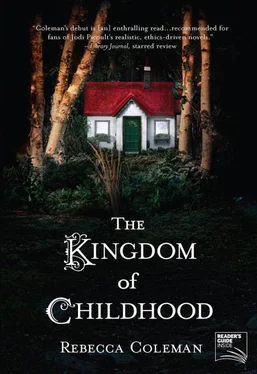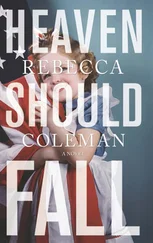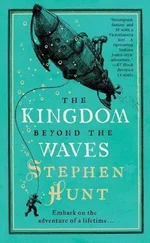Rebecca Coleman - The Kingdom of Childhood
Здесь есть возможность читать онлайн «Rebecca Coleman - The Kingdom of Childhood» весь текст электронной книги совершенно бесплатно (целиком полную версию без сокращений). В некоторых случаях можно слушать аудио, скачать через торрент в формате fb2 и присутствует краткое содержание. Город: Ontario, Год выпуска: 2011, ISBN: 2011, Издательство: MIRA Books, Жанр: Современная проза, на английском языке. Описание произведения, (предисловие) а так же отзывы посетителей доступны на портале библиотеки ЛибКат.
- Название:The Kingdom of Childhood
- Автор:
- Издательство:MIRA Books
- Жанр:
- Год:2011
- Город:Ontario
- ISBN:978-1-4592-1383-8
- Рейтинг книги:5 / 5. Голосов: 1
-
Избранное:Добавить в избранное
- Отзывы:
-
Ваша оценка:
- 100
- 1
- 2
- 3
- 4
- 5
The Kingdom of Childhood: краткое содержание, описание и аннотация
Предлагаем к чтению аннотацию, описание, краткое содержание или предисловие (зависит от того, что написал сам автор книги «The Kingdom of Childhood»). Если вы не нашли необходимую информацию о книге — напишите в комментариях, мы постараемся отыскать её.
was a semifinalist in the 2010 Amazon Breakthrough Novel Competition. An emotionally tense, increasingly chilling work of fiction set in the controversial Waldorf school community, it is equal parts enchanting and unsettling and is sure to be a much discussed and much-debated novel.
The Kingdom of Childhood — читать онлайн бесплатно полную книгу (весь текст) целиком
Ниже представлен текст книги, разбитый по страницам. Система сохранения места последней прочитанной страницы, позволяет с удобством читать онлайн бесплатно книгу «The Kingdom of Childhood», без необходимости каждый раз заново искать на чём Вы остановились. Поставьте закладку, и сможете в любой момент перейти на страницу, на которой закончили чтение.
Интервал:
Закладка:
Alle Jahre wieder
Kommt das Christuskind
Auf die Erde nieder,
Wo wir Menschen sind.
She made a salt dough shepherd and named it Rudi. She opened her tissue window and counted eight remaining. She sang the rough German hymns that sounded to her ears like the original language of humanity, like cavechildren gathered on a solstice dawn waiting for a razor of light to appear between two tall stones. Because who could say there wasn’t a Sun God? Who could call it primitive to believe, long ago, one man might have brought light into a dark world?
The effect of it all—the numbered translucent windows, the nativities with empty cradles prepared, the three lit candles and a fourth awaiting—was a feeling that time was welling beneath her feet, about to burst forth into light and fate and fury, shedding the darkness—for better or for worse—like a husk. It was the feeling that something was about to happen.
And it did.
5
It was a boiling-hot day for mid-September and, as a cost-cutting measure, the school’s air-conditioning had already been shut off for the season. At the end of the school day I steeled myself for a visit to Bobbie’s old classroom and stepped in with a commuter mug full of iced tea and my hair piled up in a clip, trailing strands that curled with sweat. The iced tea I had purchased at McDonald’s on my lunch hour and, to hide my patronage of such a corporation, guiltily dumped into my rinsed coffee mug before returning to work. In my car I covered the plastic cup with an insulated reusable bag from Whole Foods and slipped out to the parking lot for refills when nobody was looking. If there wasn’t a clause in my contract that required this behavior, there may as well have been. But I didn’t mind. If a veteran like me didn’t respect the folkways of the Steiner school, then why would anyone?
Sandy Valera stood at the front of the room erasing the blackboard with quick, efficient strokes. High above, inked onto a long banner bright with a rainbow of watercolors, scrolled the quote, “Man is both a fallen God and a God in the becoming.” Rudolf Steiner’s name was written beneath it in small but reverent capitals. It was hard to get used to seeing Bobbie’s handiwork hanging above the head of the woman who had replaced her. So many years I had known Bobbie, never imagining the absurd idea that she might die. Even after her cancer diagnosis, we all thought she was getting better until all of a sudden she wasn’t anymore—she had taken a turn, and then it went so fast. We had been a proud band marching behind our standard-bearer, and then suddenly the street ended in a jagged line and down she slipped into the black nowhere, leaving the rest of us stumbling backward, cacophonous and disoriented.
“You ready for the staff meeting?” Sandy called out to me.
“I hope so.”
“I think Dan’s got something up his sleeve,” she said. “The grand plan to bring us all wealth and happiness.”
“Why is it always about money .” I sighed. “All the things we need to address with these kids and it always boils down to the issue of money . I can’t think of a subject that bores me more.”
“You’re happy with what you make, then?”
“Of course not.”
She laughed. From a hook on the wall she retrieved her purse and looped it onto her shoulder. The hanger was brass and bore the image of three monkeys, each above its own hook: see no evil, hear no evil, speak no evil. Bobbie, who had carried no purse, always hung her jacket from the third hook. Sandy hung her purse from the first.
“Maybe he’ll give you a raise,” she teased.
“My husband would like that.”
“How was your anniversary weekend, by the way?”
“It didn’t happen. He had to work. I spent it making new dolls for the Hansel and Gretel puppet play. Exciting stuff.”
She straightened her skirt and frowned sympathetically. If she had been Bobbie, I would have expanded on that with my pent-up frustrations: how much it dragged me down that every time I walked into a room, contempt oozed out of Russ like snot out of a kid’s nose. How my children were almost grown and now I yearned to embark on all my long-deferred adventures: to see Stockholm and Amsterdam, to try absinthe and get puking drunk in the tradition of the great poets, to have wild sex in sketchy locations—with Russ would be just fine, if he was willing—and to grow myself a garden as paradisiacal as the one I remembered from my childhood. I would tell her how I felt as though Russ and I were two captives tied back-to-back to a pole, and while I was willing to whistle at the sky and look helpless until Scott left for college, I felt ready to start chewing through the restraints when nobody was looking.
But she wasn’t Bobbie. I liked Sandy, but she was only the woman I had been assigned to help get oriented on short notice; and though we might be real friends one day, we weren’t now. She was youngish and pretty and unmarried and still winked at life to suggest it come and get her. If she and I had anything in common beyond our place of employment, I did not have the ego to presume it.
And so I followed her brisk walk to the multipurpose room, hurrying on my shorter legs to keep up. Partway there she reached over and patted me on the back, as if to say she understood, or, perhaps, that she pitied me.
“We had an auditor from the Department of Health in our office this morning,” our headmaster told us teachers as we settled in for our meeting. “She is concerned about the number of religious affidavits we have on file in lieu of vaccination records. Also, it seems we have a number of families who have turned in neither a vaccination record nor an affidavit. Clearly our record-keeping leaves much to be desired.”
We stared uncomfortably at our shoes.
“We will be following up with those families in the coming weeks,” he continued. “The longer this continues, the more it makes the pro-vax and anti-vax families feel at odds with each other. We cannot afford to give anyone the impression that the atmosphere at this school is contentious. And when I say we can’t afford it, I mean that very literally. Which brings me to our next item.”
I looked up from the floor, glad to move on.
“In light of the current situation,” Dan began in an artificially cheerful voice, “we have decided to hold our first annual class ring sale for the Upper School, beginning Monday.”
The murmur was immediate, but I looked left and right despite it, calculating from my colleagues’ expressions whether they felt as shocked as I did. Surprise, but not disapproval, was apparent on the faces around me. I lifted my hand and spoke without being acknowledged.
“I disapprove,” I said.
Dan met this with a thin smile, clearly prepared for my reaction. “I understand, Judy, but the board of trustees has decided it.”
“Then the board of trustees needs to reconsider,” I countered. “Those rings can cost hundreds of dollars. They represent exactly the sort of consumerist culture we oppose here. The parents are not going to like that one bit.”
“We receive eighteen percent of each ring sold.”
I shook my head. “I don’t care if we make a hundred percent. It’s a complete contradiction of the values of the school. I understand we need to raise funds, but that is the wrong way.”
Andrea Riss, the first-grade teacher, spoke up. “Judy…with respect, our other options haven’t been realistic. The recorder and lunch basket sales netted us very little. I don’t know how it is in the kindergarten, but my classroom is suffering. Most of my chairs have threadbare seats and I only have two knights left in my castle. And my harp hasn’t had strings for a year now.”
Читать дальшеИнтервал:
Закладка:
Похожие книги на «The Kingdom of Childhood»
Представляем Вашему вниманию похожие книги на «The Kingdom of Childhood» списком для выбора. Мы отобрали схожую по названию и смыслу литературу в надежде предоставить читателям больше вариантов отыскать новые, интересные, ещё непрочитанные произведения.
Обсуждение, отзывы о книге «The Kingdom of Childhood» и просто собственные мнения читателей. Оставьте ваши комментарии, напишите, что Вы думаете о произведении, его смысле или главных героях. Укажите что конкретно понравилось, а что нет, и почему Вы так считаете.












